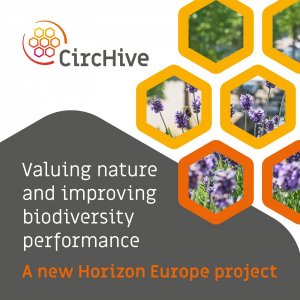
CircHive is a new Horizon Europe project that will help businesses and the public sector recognise, measure and report on the value of nature.
By recognising the value of nature, CircHive aims to help organisations make more informed decisions that protect ecosystems, enhance biodiversity and unlock new opportunities for society and businesses. As a partner in CircHive, Oppla will manage the project's communication, dissemination and exploitation activities. Oppla will develop the project branding, support stakeholder engagement and build and manage the CircHive web platform.
The EU Biodiversity Strategy for 2030 and the newly adopted Global Biodiversity Framework both call for increased action to value nature and address the challenges of climate change and biodiversity loss together. These challenges must be tackled jointly; climate change can accelerate the loss of biodiversity, while biodiversity is essential for maintaining ecosystems that help us to mitigate and adapt to climate change. Nature provides invaluable services such as clean air and water, fertile soil, pollination, erosion and flood control, and climate regulation. However, few organisations currently understand, measure or report their positive and negative impacts on nature.
CircHive is a new five-year, €11.5 million project with 15 research and 10 case-study partners. The project will develop rigorous and standardised methods for combining two approaches to valuing nature: biodiversity footprinting and natural capital accounting. These two approaches are being used by an increasing number of organisations to understand and value the nature that underpins their operations. By combining these methods, the project will provide a more comprehensive approach to valuing nature and improving biodiversity performance.
CircHive’s 10 case-study partners will bring together the latest scientific methods with organisations looking to develop sustainable business models. Case-studies include working with Lacoste to monitor the biodiversity impacts of cotton farming, with Millwood to develop sustainable forestry management practices in Ukraine and with the city of Edinburgh, Scotland to understand the impacts of new development on biodiversity and natural capital.
CircHive will work closely with other businesses and cities to develop the BEEHive (Biodiversity Excellence of Enterprises), a new community open to any organisation interested in learning how to measure and manage their impact on nature. Members of BEEHive will collaborate in the development and testing of CircHive’s outputs and will receive support in developing sustainable management practices.
CircHive aims to clearly demonstrate the benefits of valuing nature and will help to mainstream the use of biodiversity footprinting and natural capital accounting. To achieve this, the project will organise events, publish training material, prepare policy briefs and work on the standardisation of the biodiversity footprint method. Interested public and private sector actors are invited to join the co-creation in the respective BEEHive Hubs.
To find out more, visit www.CircHive.eu and follow @CircHive.
